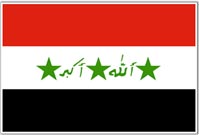Against the odds: Women struggle for a fair share in Iraq
 Baghdad - In the final days of Iraq's provincial elections campaign, women's rights advocates across the country are pressing the government to make last-minute amendments on the current provisional elections law to guarantee women a greater share of seats on the councils than in previous polls.
Baghdad - In the final days of Iraq's provincial elections campaign, women's rights advocates across the country are pressing the government to make last-minute amendments on the current provisional elections law to guarantee women a greater share of seats on the councils than in previous polls.
They are working to guarantee that women will break the previous ceiling of 25 per cent of seats.
According to the Iraqi constitution, women are allocated 25 per cent of the total seats in both the Iraqi parliament and provincial councils. The last elections to both were held in 2005.
However, Amal al-Beiraqdar, member of the Independent High Electoral Commission in Iraq (IHEC), the body charged with overseeing balloting, explained there was no set quota for women in the current provincial elections law.
In fact, the current provincial law, which changed several times and was finally published in October, failed to maintain the specific references to required seats for women that appeared in earlier drafts.
The original stipulation was that women were to receive every third seat that a party was allocated after the voters had made their choice.
But as polling day nears, the only reference to the matter in the law was a vague phrase which said that "there had to be a woman at the end of every three winners," al-Beiraqdar told Deutsche Presse-Agentur dpa.
While al-Beiraqdar believes that this might ensure even more seats for women, others believe that this applies only to parties that have multiple candidates and win multiple seats.
That may work in more populous provinces. But in other provinces, some parties that win seats may consist of only one or two local leaders - and they are unlikely to be women.
"We are trying to reinstate the principle of allocating a certain quota to women in the election law. We are even pushing that the quota would be 30 per cent," Hanaa Edward, member of the Amal association, an Iraqi women's network told dpa.
In its last report, the IHEC said there were 3,612 women candidates, out of a total of 14,431 individuals competing for the 440 local seats in 14 provinces.
To guarantee greater participation by women, the IHEC has launched campaigns for the political education of women, and encouraged them to participate in the elections. Women's associations have also been campaigning heavily in the media and on the street.
With all these efforts however, a poll conducted by the national al-Sabah newspaper showed that of the 43 per cent of eligible voters who are willing to vote, 62 per cent support independent candidates while women's lists got 6.4 of the voters.
In short, women still face the challenge of tribal and family traditions.
When female candidates post their campaign material, many are either torn or marked with indecent comments.
Ironically, most of the torn posters belong to veiled women candidates, who have frequently been the only ones who dared to post their photos.
Unveiled female candidates, on the other hand, in fact retain a limited space of freedom to campaign - if they choose not to go public. Women candidates have gone, in effect, "underground" for fear being subject to defamation campaigns.
Speaking to dpa, Iraqi Minister of Women's Affairs Nawal Samaraie, said she found it normal that women's photos were less evident than those of the men, as the latter outnumber them. However, she said she hoped that "Iraqis will vote for the more efficient and not for the more posted."
"Men's campaigns are incomparable to women's. This is of great concern with regard to women's performance in the coming elections," Azhar al-Sheihly, a former minister and a women's activist, told dpa.
Despite the discouragements, women candidates are taking the challenge.
Nidal al-Saady is a 49-year-old teacher and mother of five who wears the veil. She is one of the female candidates whose poster has disappeared under another - for a turbaned, religious male candidate.
However, Al-Saady, whose first name translates into "struggle" in English, said she was determined to complete what she started nearly two months ago - despite the fact that this election campaign has seen many violations.
"I spend many hours in the Baghdad streets discussing my programme with people in freedom and transparency. In order to reach my goal I do not leave space for fear," she says. (dpa)